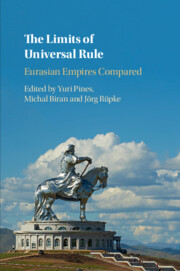Book contents
- The Limits of Universal Rule
- The Limits of Universal Rule
- Copyright page
- Contents
- Maps
- Figures
- Contributors
- Abbreviations
- Preface
- Introduction
- 1 From the Mediterranean to the Indus Valley: Modalities and Limitations of the Achaemenid Imperial Space
- 2 Limits of All-Under-Heaven: Ideology and Praxis of “Great Unity” in Early Chinese Empire
- 3 The Roman Empire
- 4 The Medieval Roman Empire of the East as a Spatial Phenomenon (300–1204 CE)
- 5 Early Islamic Imperial Space
- 6 The Mongol Imperial Space
- 7 The Territories and Boundaries of Empires
- 8 Delimiting the Realm Under the Ming Dynasty
- 9 The Expansion of the Qing Empire Before 1800
- 10 All Under the Tsar
- Index
- References
9 - The Expansion of the Qing Empire Before 1800
Published online by Cambridge University Press: 07 January 2021
- The Limits of Universal Rule
- The Limits of Universal Rule
- Copyright page
- Contents
- Maps
- Figures
- Contributors
- Abbreviations
- Preface
- Introduction
- 1 From the Mediterranean to the Indus Valley: Modalities and Limitations of the Achaemenid Imperial Space
- 2 Limits of All-Under-Heaven: Ideology and Praxis of “Great Unity” in Early Chinese Empire
- 3 The Roman Empire
- 4 The Medieval Roman Empire of the East as a Spatial Phenomenon (300–1204 CE)
- 5 Early Islamic Imperial Space
- 6 The Mongol Imperial Space
- 7 The Territories and Boundaries of Empires
- 8 Delimiting the Realm Under the Ming Dynasty
- 9 The Expansion of the Qing Empire Before 1800
- 10 All Under the Tsar
- Index
- References
Summary
This chapter analyzes the expansion of the Qing Empire between 1583 and 1800, paying particular attention to the factors determining the ultimate boundaries of the realm. It argues that imperial expansion can most convincingly be explained as a Manchu effort to dominate both China and the territory of the Mongols and Oirats. While the conquest of China was completed relatively quickly, the absorption of Mongol territories was protracted, fitful, and ultimately involved expansion elsewhere in Inner Asia, notably Tibet and the Tarim Basin (southern Xinjiang). Qing rulers adopted distinct political strategies for different zones of their empire: China was ruled chiefly via bureaucratic practices adapted from the preceding Ming regime, while much of Inner Asia was ruled by indigenous leaders kept under close Manchu oversight. Efforts to divide the empire into segments governed by distinct political and ideological norms began to break down by 1800.
Information
- Type
- Chapter
- Information
- The Limits of Universal RuleEurasian Empires Compared, pp. 316 - 341Publisher: Cambridge University PressPrint publication year: 2021
References
Accessibility standard: Unknown
Why this information is here
This section outlines the accessibility features of this content - including support for screen readers, full keyboard navigation and high-contrast display options. This may not be relevant for you.Accessibility Information
- 1
- Cited by
